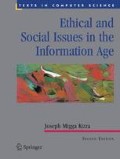Abstract
Artificial intelligence (AI), cyberspace (CP), and virtual reality (VR) are all exciting technological frontiers offering novel environments with unlimited possibilities. The AI environment works with the possibilities of understanding and extending knowledge to create intelligent agents perhaps with a human-value base, intended to help solve human problems; the CP environment investigates the reality of the assumed presence of objects and peers: You know they are there, but you do not know where or who is “really” out there; and the VR environment simulates the reality of “other worlds” through modeling and creating better tools for understanding the complexities of our world, thus moving humanity closer to a better way of living.
Access this chapter
Tax calculation will be finalised at checkout
Purchases are for personal use only
Preview
Unable to display preview. Download preview PDF.
References
Kanade, Takeo, Michael Reed, and Lee Weiss. “New Technologies and Applications in Robots.” Communications of the ACM 37(3), 1994, pp. 58–67.
Maes, Pattie. “Agents that Reduce Work and Information Overload.” Communications of the ACM 37(7), 1994, pp. 30–40.
-. “Artificial Life Meets Entertainment: Lifelike Automous Agents.” Communications of the ACM 38(11), 1995, pp. 108–117.
Edmonds, Ernest, Linda Candy, Recheal Jonas, and Bassel Soufi. “Support for Collaborative Design: Agents and Emergence.” Communications of the ACM 37(7), 1994, pp. 41–47.
Etzioni, Oren, and Daniel Weld. “A Softbolt-Based Interface to the Internet.” Communications of the ACM 37(7), 1994, pp. 72–76.
Mitchell, Tom, Rich Caruana, Dyne Feritag, John McDermott, and David Zabowski. “Experience with a Learning Personal Assistant.” Communications of the ACM 37(7), 1994, pp. 81–91.
Selker, Ted. “A Teaching Agent That Learns.” Communications of the ACM 37(7), 1994, pp. 92–99.
Riecken, Doug. “M: An Architecture of Integrated Agents.” Communications of the ACM 37(7), 1994, pp. 107–116.
Turing, A.M. “Computing Machinery and Intelligence” Mind 59, 1950, pp. 433–460.
Munakata, Joshironi. “Commercial and Industrial AI.” Communications of the ACM 37(3), 1994, pp. 23–25.
Luger, George, and William Stubblefield. Artificial Intelligence (2nd ed.). Reading, MA: Benjamin Cummings, 1993.
Asimov, Isaac. The Rest of the Robot. New York: Doubleday, 1964.
Williamson, Jack. “With Folded Hands.” In The Best of Jack Williamson. New York: Ballantine, 1978, pp. 154–206.
Waldrop, Mitchell. “A Question of Responsibility.” In R. Dejoie, George Fowler, and David Paradice (eds.), Ethical Issues in Information Systems., Boston, MA: Byrd & Fraser, 1991.
Beardon, Collins. “The Ethics of Virtual Reality.” Intelligent Tutoring Media 3(1), 1992, pp. 22–28.
Minsky, Marvin, and Doug Riecken. “A Conversation with Marvin Minsky About Agents.” Communications of the ACM 37(7), 1994, pp. 23–29.
Carbonell, Jaime. Subjective Understanding: Computer Models of Belief Systems. Ann Arbor: University of Michigan Press, 1979.
McAdams, Mindy. “Cyberspace: Two Flavors” http://www.well.com/user/mmcadams/
Gibson, William. Neuromancer. New York: Ace Books, 1984.
Vickers, D.L. “Sorcerer’s Apprentice: Head-Mounted Display and Wand.” In J.A. Bist and H.L. Hast (eds.), A Symposium on Visually Coupled Systems: Development and Applications. AMD, TR 73-1, 1972.
Singh, Gurrinder, Steven Feiner, and Daniel Thalmann. “Virtual Reality: Software and Technology,” Communications of the ACM 39(5), 1996, pp. 35–36.
Bryson, Steve. “Virtual Reality in Scientific Visualization.” Communications of the ACM 39(5), 1996, pp. 62–71.
Bayani, Salvador, Marcos Fernandez, and Mariano Pevez. “Virtual Reality for Driving Simulation.” Communications of the ACM 39(5), 1996, 72–76.
Further Reading
Barlow, John. “Electronic Frontier: Private Life in Cyberspace.” Communications of the ACM 34(8), 1991, pp. 23–25.
Bates, Joseph. “The Role of Emotion in Believable Agents.” Communications of the ACM 37(7), 1994, pp. 122–125.
Boden, Margaret. “Agents and Creativity.” Communications of the ACM 37(7), 1994, pp. 117–121.
Cowie, Jim, and Wendy Lehner. “Information Extraction.” Communications. of the ACM 39(1), 1996, pp. 80–91.
Green, Menlo, and Sean Halliday. “A Geometrical Modelling and Animation System for Virtual Reality.” Communications of the ACM 39(5), 1996, pp. 46–53.
Hayes Roth, F, and Neil Jacobstein. “The State of Knowledge-Based Systems.” Communications of the ACM 31(3), 1994, pp. 22–39.
Kanade, Takeo, Micheal Read, and Leve Weiss. “New Technologies and Application in Robots.” Communications of the ACM 31(3), 1994, pp. 58–67.
Munakato, Tbshimori, and Yashant Jani. “Fuzzy Systems: An Overview.” Communications of the ACM 31(3), 1994, pp. 69–75.
Norman, Donald. “How Might People React with Agents?” Communications of the ACM 37(7), 1994, pp. 68–71.
Poston, Timothy, and Luis Serra. “Dextrous Virtual Work: Introduction.” Communications of the ACM 39(5), 1996, pp. 37–45.
Riecken, Doug. “Intelligent Agents: Introduction.” Communications of the ACM 37(7), 1994, pp. 18–21.
Schoppers, Marcel. “Real-Time Knowledge-Based Control Systems.” Communications of the ACM 34(8), 1991, pp. 27–30.
Singh, G., Steven Fisher, and Daniel Thalmann. “Virtual Reality Software and Technology: Introduction.” Communications of the ACM 39(5), 1996, pp. 35–36.
Webe, Janyce, Gracme Hirst, and Dianne Horton. “Language Use in Context.” Communications of the ACM 39(1), 1996, pp. 102–111.
Wilkes, Maurice. “Artificial Intelligence as the Year 2000 Approaches.” Communications of the ACM 35(8), 1992, pp. 17–20.
Wilkes, Yonick. “Natural Language Processing.” Communications of the ACM 39(1), 1996, pp. 60–62.
Editor information
Editors and Affiliations
Rights and permissions
Copyright information
© 2003 Springer-Verlag New York, Inc.
About this chapter
Cite this chapter
(2003). New Frontiers For Computer Ethics. In: Kizza, J.M. (eds) Ethical And Social Issues In The Information Age. Texts in Computer Science. Springer, New York, NY. https://doi.org/10.1007/978-0-387-22466-4_10
Download citation
DOI: https://doi.org/10.1007/978-0-387-22466-4_10
Publisher Name: Springer, New York, NY
Print ISBN: 978-0-387-95421-9
Online ISBN: 978-0-387-22466-4
eBook Packages: Springer Book Archive

